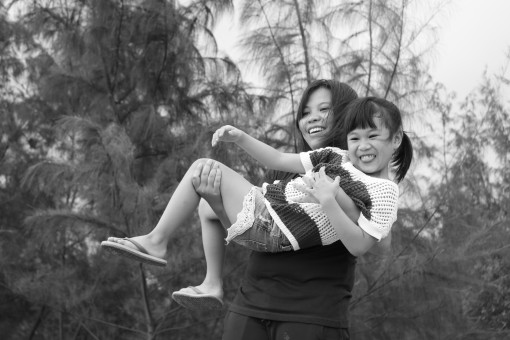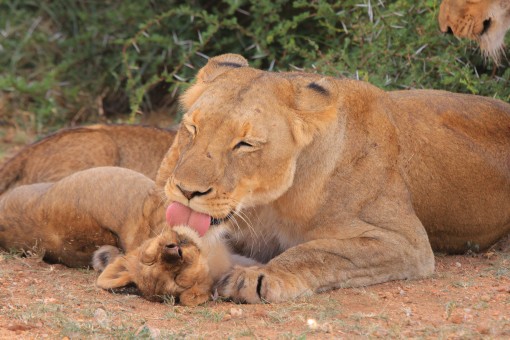Genesis 1:26-27 reveals, among many other truths, that before the creation of the world, the three persons of the Godhead lived in community, communication and communion. In John 17:24 Jesus says that the Father loved the Son “before the foundation of the world.” Being made in the image of God, we were created for relationship, made to love.
The core of our existence is our being, not as our modern materialistic culture says, our having. We are human beings, not human havings. The fundamental nature of who we are is not what we have, but our relationship with God, with fellow human beings and with creation.
Motherhood is a reflection of the One who created mothers. The mother’s heart was created to reflect the nurturing heart of God. An old Jewish proverb says, “God could not be everywhere, and therefore He made mothers.” To put it differently, God incarnated His nurturing heart when He designed and made the woman (see Woman, the Life Giver).
proverb says, “God could not be everywhere, and therefore He made mothers.” To put it differently, God incarnated His nurturing heart when He designed and made the woman (see Woman, the Life Giver).
As mother, economist and writer Ann Crittenden has wisely said, “Mothers themselves often refer to the essence of childrearing as simply ‘being there,’ putting one’s time at the disposal of another and signaling that the other’s needs come ahead of one’s own.”
We want to explore the wonder and beauty of simply “being there,” the miracle of a woman’s maternal heart, her design to nurture. God gave the world women to nurture the nations.
From Nurturing to Nursing
While the word nursing is still prevalent today, the concept of nurturing is out of favor with the modern and postmodern worlds. The term comes from an earlier time, when the world recognized the existence of the transcendent creator God. The concept of nurturing—whether a nursing mother or the cultivating professions of nurse, nutritionist or educator—is rooted in the transcendent maternal heart.
Transcendent nurturing is manifested in the female body. The act of nursing a baby is a physical manifestation of nurturing.
These words reflect the intimate relationship between mother and child, the physical comfort, the means of growth, the reaching of potential, and the transmission of education that entails both knowledge and the development of virtue in a child.
Words are the shapers of our lives and communities. It is important that we understand the words we are speaking. Let’s look at the root meaning of nurturing and nursing.
The meaning of nurture
What does this most intimate and often lost art of nurture mean? Let’s go back to the roots. The Old Testament has one Hebrew word that reflects nurture, the Greek New Testament has two.
nurture, the Greek New Testament has two.
The Hebrew word is kuwl, translated “feed, sustain, nourish, hold.” Notice the organic, life-giving, high-touch nature of this word.
The first Greek word is trepho, translated: feed, nourish, bring up. This word is derived from the word entrepho – to nourish in: a person or a thing; metaphorically: to educate, form the mind. [emphasis added] Note here the physical impact on the body, and the mental and spiritual impact on the soul.
The second Greek word is paideia – chastening, nurture, instruction, chastisement. It relates to the whole training and education of children (including the cultivation of mind and morals). It also includes the training and care of the body, and instruction which aims at increasing virtue. Note that the word nurture is related to education and the fortifying the mind with knowledge and the heart with virtue.
Consciously written from a Judeo-Christian worldview, Webster’s 1828 Dictionary of American English includes this listing:
NUR’TURE, noun
– That which nourishes; food; diet.
– That which promotes growth; education; instruction. Ephesians 6:4.
NUR’TURE, verb transitive
– To feed; to nourish.
– To educate; to bring or train up.
He was nurtured where he was born.
Note that the word nurture relates to physical food and nourishment for the growth of the body. It also encompasses the nourishment of the soul, to educate and cultivate the child.
The meaning of nurse
What does this most basic word nurse mean? The Hebrew for nurse is yanaq: to suck, to nurse, nursing mother. The Greek word, trophos, is translated nurse.
NURSE, verb transitive
– To tend, as infants; as, to nurse a child.
– To suckle; to nourish at the breast.
– To feed; to maintain; to bring up. Isaiah 60:4.
– To cherish; to foster; to encourage; to promote growth in.
– To manage with care and economy, with a view to increase; as, to nurse our national resources.
As Noah Webster rooted the definitions of American English in the biblical worldview, he often  referenced words to Scripture. In the case of the word nurse he pointed to Isaiah 60:4, “Lift up thine eyes round about, and see: all they gather themselves together, they come to thee: thy sons shall come from far, and thy daughters shall be nursed at thy side” (KJV).
referenced words to Scripture. In the case of the word nurse he pointed to Isaiah 60:4, “Lift up thine eyes round about, and see: all they gather themselves together, they come to thee: thy sons shall come from far, and thy daughters shall be nursed at thy side” (KJV).
Note that the word nurse is rooted in the concept of nurturing, by its very nature is touching the soul, not merely the body. Or to say it differently, a mother breast-feeding her baby is not simply giving milk. She is, in that moment, cherishing, comforting, educating, promoting growth of the soul. She is manifesting her transcendent nature. She is nurturing her child, caring for a nation’s most precious resource.
Maternal feminist and American poet Lydia Sigourney captures this when she writes of the mother’s commission is to light the lamp of the soul of her child:
Is it not requisite that they, on whose bosom the infant heart must be cherished, should be vigilant to watch its earliest pulsations for good and evil? [sic] that they who are commissioned to light the lamp of the soul should know how to feed it with pure oil?
Note the intimacy of the maternal heart of the parent and the heart of the child. The mother is to concern herself with the moral development of her young charge. Just as God created the first man and breathed His spirit into him (Genesis 2:7), so the mother who brought forth her child into the world is to light the lamp of her child’s soul by her nurturing care. God’s nature as Creator, Nurturer, Nourisher and Provider are manifest in the maternal heart of a woman.
Webster’s 1828 is instructive:
– To tend, as infants; as, to nurse a child.
– To suckle; to nourish at the breast.
– To cherish; to foster; to encourage; to promote growth in. We say, to nurse a feeble animal or plant.
– To manage with care and economy, with a view to increase; as, to nurse our national resources
The word nurse is the physical manifestation of the transcendent term nurture. Note that in addition to a mother nursing an infant, the word has a broader meaning in the promotion of growth and the stewarding of a nation’s resources.
The Nature of Motherhood
A woman can do most things a man can do. A man can do many things a woman can do. But some things only a woman can do. A man cannot become pregnant, form life in a womb, give birth to a new human being and nurture the soul of that human being. It takes a woman to be a mother. Her gaze, her touch, her eyes, the nurture of her breast are uniquely and powerfully female.
A woman can do many things. One thing she is especially designed to do is nurture the next generation. Woman, in the very fiber of her being, was made to nurture.
to nurture.
In our modern materialistic culture, things are more important than relationships. The woman’s ability to nurse and nurture a child has very little cachet. As a result, families are dissolving. Children may be provided with things, but know little of a mother’s nurture. We are reaping the harvest of growing depression in childhood, adolescence and adulthood. Those never nurtured by a maternal heart seek identity and escape in drugs, alcohol, recreational sex, and extreme, death-defying sports.
Motherhood is beautiful, wonderful, and vital to the health of families, children and the future of a stable and flourishing nation. No amount of cold, hard plastic toys will replace the warm, human touch of a mother. No amount of staring into a screen will replace the loving gaze of a mothers eyes. No amount of material things will replace the art of “being there.” Our children, communities and nations are starving for the presence of the maternal, nurturing heart.
As we have written elsewhere, modern feminism rooted in materialistic culture says that a woman’s worth is found in the marketplace rather than the domestic space, in producing money and things rather than raising healthy children. A sexist culture promotes the lie that the male is superior to the female. Women seek fulfillment in being like a man. In both sexist and modern feminist culture, maleness is the hyper value.
An unknown author has stated, “Our generation is becoming so busy trying to prove that women can do what men can do that women are losing their uniqueness. Women weren’t created to do everything a man can do. Women were created to do everything a man can’t do.”
 Likewise an unattributed quote offers the challenge from another angle.
Likewise an unattributed quote offers the challenge from another angle.
The lioness does not try to be the lion. She embraces her role as the lioness. She is powerful, strong and nurturing. She does not mistake her meekness for weakness. The world needs more kind, compassionate, humble faithful preserving, confident, fierce, bold, pure and tender-hearted women.
It is the mother’s nurturing nature, her being there, more than virtually anything else, that contributes to the mental, physical and moral health of her children, which health is a predictor of the moral health of the marketplace and the public square. Indeed the hand that rocks the cradle is the hand that rules the world.
Let us restore, as a people and a culture, the wonder, beauty of the feminine and female. Let us restore the glory of the maternal heart to a central place in our culture. Let’s celebrate being there, placing children, rather than things at the center of our lives. After all, the home is the nursery of a nation.
– Darrow Miller
This DM&F Classic post is a supplement to the book Nurturing the Nations. You can purchase the original work here.






